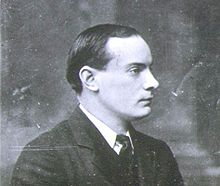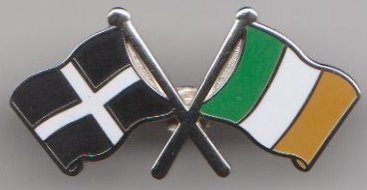The 100th Anniversary Commemoration of the 1916 Easter Uprising in Ireland - the Cornish connection.
News From Kernow Matters To You
Easter 2016 marks the centenary of the Easter Rising in Dublin and massive celebrations are set to occur in Ireland as this marked the defining moment in Ireland's struggles for independence.
Events here: http://www.visitdublin.com/see-do/details/easter-rising-centenary/510660/#53.349805|-6.260310|16
We wish our Irish friends well during this important and historical occasion and sent warm greetings.
Pádraig Pearse - 10 November 1879 – 3 May 1916
One of the most prominent leaders of the Easter Rising was Pádraig Pearse.
Pádraig Pearse who was an Irish teacher, barrister, poet, writer, nationalist and political activist and one of the leaders of the Easter Rising.
Patrick Henry Pearse was born in Dublin. His surname is still common in Cornwall. His father James, a Catholic convert, was from a Cornish nonconformist family and a stonemason, who held home rule views and his mother, Margaret, was from an Irish-speaking family in County Meath. James Pearse was himself the son of a Cornish Methodist. The Anglo-centric historical records often indicate that Pearse was part Englishman that his father was from Birmingham. The truth is that he was not! Padraig Pearse was of Cornish and Irish blood.
When eventually the Easter Rising did erupt on Easter Monday, 24 April 1916, having been delayed by one day due to fears that the plot had been uncovered, it was Pearse, as President, who proclaimed a Republic from the steps of the General Post Office, headquarters of the insurgents, to a bemused crowd. When, after several days fighting, it became apparent that victory was impossible, he surrendered, along with most of the other leaders. Pearse and fourteen other leaders, including his brother Willie, were court-martialled and executed by firing squad. Thomas Clarke, Thomas MacDonagh and Pearse himself were the first of the 'rebels' to be executed, on the morning of 3 May 1916. Pearse was 36 years old at the time of his death.
Pádraig Pearse wrote these words in 'The Spiritual Nation' published in 1916 by Whelan & Son of Dublin:
'Freedom is a condition which can be lost and won and lost again; nationality is a life which, if once lost, can never be recovered. A nation is a stubborn thing, very hard to kill; but a dead nation does not come back to life, any more than a dead man. There will never again be a Ligurian nation, nor an Aztec nation, nor a Cornish nation'.
The near death of his father's and grandfather's Nation and fate of the Cornish people may well have inspired this man to take up the cause for Ireland.
We now see a free Ireland of 26 Counties with six still retained by the Union and a Cornish people finally recognised in law by the English Establishment and others further afield in Europe. It has been a long journey. We all know of the route ahead.
The links between Kernow and Eire are strong.
References:
http://www.infomutt.com/p/pa/patrick_pearse.html
https://thedublinreview.com/a-series-of-accidents/
http://encyclopedia.kids.net.au/page/pa/Padraig_Pearse
'The Collected Works of Padraic H Pearse' Padraic H Pearse 1922 ISBN 1304578712
'The Spiritual Nation' Padraic H Pearse 1916 Whelan & Son of Dublin (held at University College, Cork)
'Dividing Ireland - World War One and Partition' Thomas Hennessy Professor of British and Irish History ISBN 9780415198806
John, Teresa, Craig, Tony, Matt, Mike, Clive & Samuel
Elected Members of the KMTU Steering Group
Photograph shows Padraig Pearse
![]()


- Mair Williams's blog
- Log in to post comments





